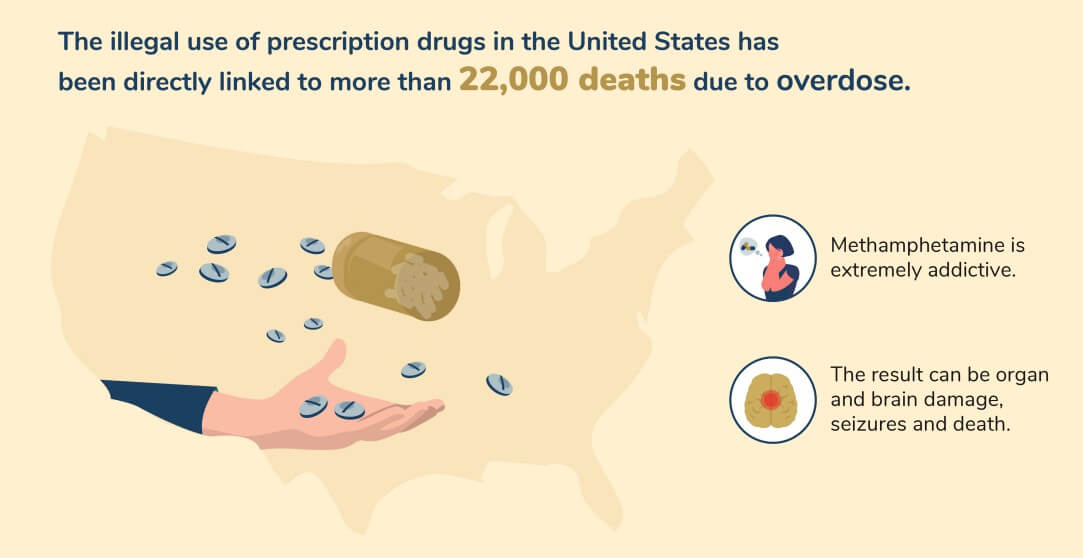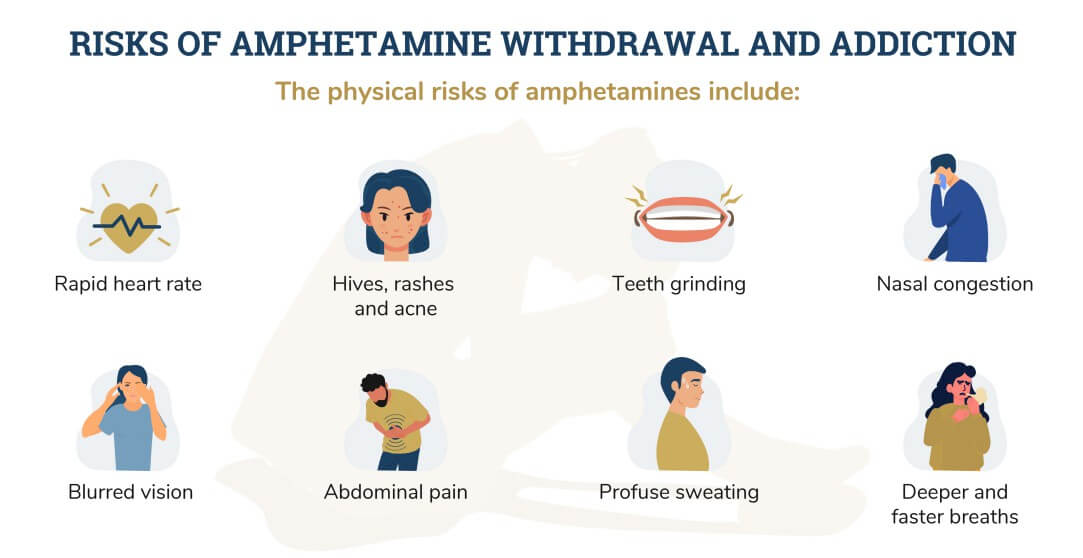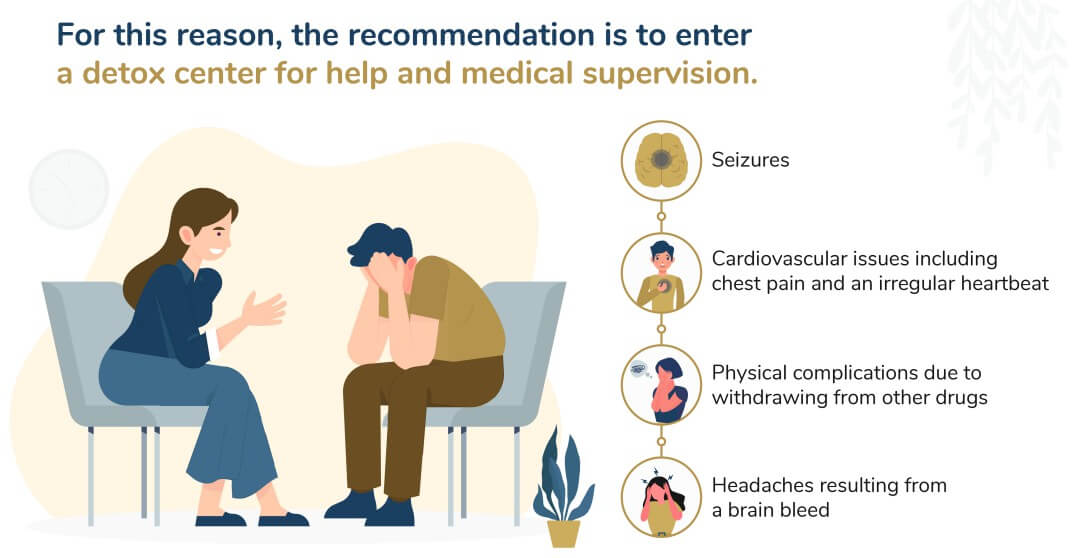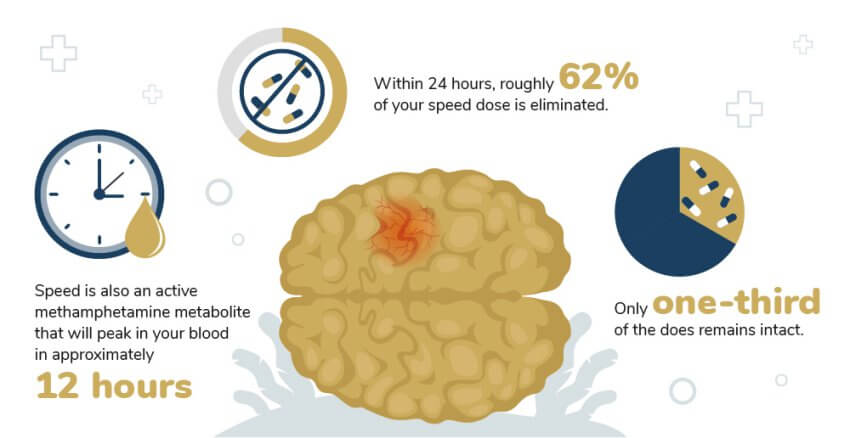Amphetamines are stimulants for the central nervous system. The drug increases energy, focus and alertness. Some amphetamines are legal by prescription only including Dexedrine and Adderall. These medications are prescribed by physicians for the treatment of children with ADHD and adults with narcolepsy. The first amphetamines were created during the late 1800s in Germany, but the discovery of the stimulant properties did not occur until the 1930s.
This was when amphetamines were used for the treatment of nasal congestion. As time passed, amphetamines were also used for the treatment of a wide variety of conditions. This included weight loss, hangovers from excess alcohol and nearly everything in between. The two conditions still treated with this drug are narcolepsy and ADHD. Narcolepsy is a condition where the individual falls asleep suddenly. ADHD is hyperactivity in children and young adults.
Sometimes, amphetamines are used for the treatment of depression. More than six million prescriptions for amphetamines are written every year in the United States alone. The withdrawal process for amphetamines can be dangerous and should not be performed without supervision or at home. When the drug is used correctly, it is both safe and legal. Unfortunately, amphetamines are also addictive and habit-forming. During the last few years, more people began using this drug despite the lack of any medical need.

Visits to the emergency room resulting from the use of illegal amphetamines have increased three-fold during the past decade. When prescribed by a doctor for specific health conditions, amphetamines are extremely helpful. When illegal, off-label street versions are used they are often dangerous. The illegal use of prescription drugs in the United States has been directly linked to more than 22,000 deaths due to overdose. The illegal, street-versions of this drug negatively impact society as a whole including ecstasy and methamphetamines.
Ecstasy often raises the core temperature of the user to a dangerous high. The result can be organ and brain damage, seizures and death. Although Ecstasy is not as physically addictive as many of the other amphetamines, it is addictive psychologically. The drug frequently causes the user legal, health and financial difficulties. One of the most dangerous street drugs is methamphetamines due to the long-term effect on the health of the user.
Methamphetamine is extremely addictive. The drug is diluted or cut using deadly and harsh chemicals. Using meth can cause severe damage to your cardiovascular system, skin, facial tissues and teeth. Where meth is either injected or smoked, amphetamines can be snorted or injected. Once you consume the drug, stress hormones are released including adrenaline. Blood is diverted to your muscles from your gut and there is an increase in your blood pressure and heart rate.
Amphetamines give you an intense, euphoric feeling and increase your energy and focus. Using this drug can also cause paranoia and aggression while decreasing your appetite to a dangerously low level. Amphetamines are abused by people working long hours at demanding jobs, students and individuals suffering from mental health conditions due to the effects. One of the groups at the highest risk of prescription amphetamine abuse is students attending universities or colleges.
Once you come down from the high you receive with this drug, you will most likely experience a significant crash in your energy levels. Sensory issues are also possible such as the feeling of bugs crawling around beneath your skin. The risk is even higher if you are using meth. You may start to feel depressed, nauseous or irritated. You might be trying to escape these feelings and eliminate the crash by using other drugs or more amphetamines.
When you are recovering from amphetamine abuse, you will most likely need to face numerous complicated health issues including amphetamine withdrawal. Using amphetamines illegally is bad, using the drug with other drugs is even worse and extremely dangerous.
When you abuse amphetamines, you are risking long-term health issues including:

The physical risks of amphetamines include:
The psychological risks include:
Due to the severe stress placed on your body and the highly addictive nature of amphetamines, you will need to complete medical detox before you can start inpatient rehab. During medical detox, you remain under the care of a doctor to ensure you can go through amphetamines withdrawal as safely as possible. The potential danger of amphetamine withdrawal requires the supervision of medical staff to decrease the most severe symptoms of withdrawal. The most common symptoms include:
The majority of recovering addicts have withdrawal symptoms between five days and three weeks. Some individuals have lingering symptoms including anxiety and depression persist for months after quitting the drug. Your timeline is dependent on a variety of factors including how long you have been abusing drugs, the drugs you have abused, your metabolic rate and weight. In most circumstances, your first symptoms of withdrawal will occur within 36 hours.
Between one and two days after you quit, you will have an amphetamine crash including the need for more sleep, increased appetite, dysphoria and cravings for amphetamines. The next phase of your timeline lasts between five days and a few weeks. This is when you will experience:
Even after you stop abusing amphetamines, you can experience mood-regulating issues, memory issues, prolonged cravings, social impairment, and depression for weeks or even years. If you have abused amphetamines for years and combined them with other drugs, there is a higher risk of experiencing withdrawal symptoms for the long-term. The majority of people in detox do not have severe physical withdrawals. Despite this, there is a small risk it can happen.

Any withdrawal complications from amphetamines are severe as opposed to some of the other drugs. For this reason, the recommendation is to enter a detox center for help and medical supervision. The complications and physical issues you may experience include:
Abusing amphetamines can result in psychological issues because your perception of reality and brain chemistry are severely altered. During the process of withdrawal, you can feel depressed, aggressive, anxious and paranoid. While in recovery, you can have issues with relationships and social functioning while suffering from delusions. Doctors and therapists in both rehab centers and detox facilities have been trained to handle the psychological issues often resulting from withdrawal.
If you are at home, your friends and family do not have the training to handle your symptoms. This can result in injury. If you experience paranoia and delusions while in withdrawal, you can become scared and aggressive and harm yourself or your loved ones.
Amphetamines are a type of drug and can be illegal or legal. If you are using amphetamines with a doctor’s prescription as a treatment for health issues including ADHD, narcolepsy or obesity, the drug is legal. Even legal use can result in addiction. If you use amphetamines to improve your performance or get high without a prescription, the drug is illegal.
In this instance, amphetamines become recreational or street drugs. Using them can result in abuse and addiction. There are different types of illegal or street amphetamines referred to as whiz, uppers, speed, louee and goey. If you illegally use medication intended to treat ADHD, it is called kiddie-speed, uppers, pep pills and dexies. Amphetamines in the liquid form are called liquid red, red speed, leopard’s blood and ox blood.

Amphetamines in a solid crystal form are called crystal, fast, ice, speed, pure, base, d-meth, glass, meth, whiz and wax. There are different forms of illegal amphetamines including:
Each type can be used differently including:
If you quit amphetamines cold-turkey, your withdrawal side effects will be a lot more severe. When you stop using the drug suddenly, your risk of severe psychological and physical side effects increases. When you withdraw in medical detox, the drug is gradually tapered off. You are supervised by doctors with all necessary precautions in place to prevent any harm during your withdrawal symptoms.
Amphetamine addiction should not run your life. If you are struggling to get sober, call us right now and start taking your life back.
Doctors safely prescribe medication for nausea, sleep aids, SNRIs and SSRIs during recovery from amphetamine abuse. Mood stabilizers and anti-anxiety medications are also beneficial. The issue is anyone detoxing at home with psychosis can self-medicate with amphetamines. Doctors in detox know the difference between the causes of each symptom. This means psychotic symptoms triggered by withdrawal can be alleviated. Patients with psychotic health issues receive the correct treatment in a safe environment according to the specific disorder.
It is unsafe for you to have access to other drugs, weapons or social influences helping you with your addiction to amphetamines. This is the reason it is critical to stop using drugs in a professional and safe medical setting. Both medical detox and rehab will keep you away from any harmful influences. You will be given legal and safe medication by medical professionals to lessen your withdrawal symptoms. If you do not receive help with your painful withdrawal symptoms, there is a higher risk you will relapse.
You will first receive an examination to determine if you have any underlying conditions for either mental or physical health. You will be monitored for any sign of other drugs you have abused. You will remain in a serene, quiet and safe environment with therapists and physicians available at all times. The first symptom is usually fatigue. You can rest and recover in a detox facility. You will be given supplements and the encouragement to eat highly nutritious food.
In most cases, an amphetamine addiction will leave you undernourished because your appetite is suppressed by the drug. When necessary, you will be given short-term sleep aids for nightmares or insomnia. Therapists are available to help if you experience feelings of depression or anxiety. You will receive encouragement for exploring the reasons behind your amphetamine addiction with any mental issues addressed. After the severity of your symptoms has decreased, you can start inpatient rehab.
You will then begin working with trained counselors on a more in-depth basis. During therapy, you will plan for a life outside without drugs. You will receive counseling on coping with stress and what to avoid to prevent a relapse. Counselors will show you how to reconstruct your life so you do not risk picking up old habits or spending time with people using drugs. Support after you leave the facility is maintained with family therapy.
At Asana Recovery, we create a customized plan will be in place to prevent you from relapsing or taking the right steps quickly if you do. Addiction to amphetamines is dangerous and will affect the quality of your life. If left untreated, your addiction can end your life. Help is available and you can learn how to live a good life without drugs.
Amphetamine addiction can affects every aspect of life. Asana Recovery can get you back on the road to recovery. Contact us now!
At Asana Recovery, we understand the challenges of amphetamine addiction and withdrawal. Our compassionate team provides personalized care through a variety of programs designed to help you recover safely and effectively. No matter where you are in your recovery, we have the right program for you:
Contact us today to start your recovery from amphetamine withdrawal. We’re here to guide you every step of the way.

Asana Recovery
We firmly believe that the internet should be available and accessible to anyone, and are committed to providing a website that is accessible to the widest possible audience, regardless of circumstance and ability.
To fulfill this, we aim to adhere as strictly as possible to the World Wide Web Consortium’s (W3C) Web Content Accessibility Guidelines 2.1 (WCAG 2.1) at the AA level. These guidelines explain how to make web content accessible to people with a wide array of disabilities. Complying with those guidelines helps us ensure that the website is accessible to all people: blind people, people with motor impairments, visual impairment, cognitive disabilities, and more.
This website utilizes various technologies that are meant to make it as accessible as possible at all times. We utilize an accessibility interface that allows persons with specific disabilities to adjust the website’s UI (user interface) and design it to their personal needs.
Additionally, the website utilizes an AI-based application that runs in the background and optimizes its accessibility level constantly. This application remediates the website’s HTML, adapts Its functionality and behavior for screen-readers used by the blind users, and for keyboard functions used by individuals with motor impairments.
If you’ve found a malfunction or have ideas for improvement, we’ll be happy to hear from you. You can reach out to the website’s operators by using the following email
Our website implements the ARIA attributes (Accessible Rich Internet Applications) technique, alongside various different behavioral changes, to ensure blind users visiting with screen-readers are able to read, comprehend, and enjoy the website’s functions. As soon as a user with a screen-reader enters your site, they immediately receive a prompt to enter the Screen-Reader Profile so they can browse and operate your site effectively. Here’s how our website covers some of the most important screen-reader requirements, alongside console screenshots of code examples:
Screen-reader optimization: we run a background process that learns the website’s components from top to bottom, to ensure ongoing compliance even when updating the website. In this process, we provide screen-readers with meaningful data using the ARIA set of attributes. For example, we provide accurate form labels; descriptions for actionable icons (social media icons, search icons, cart icons, etc.); validation guidance for form inputs; element roles such as buttons, menus, modal dialogues (popups), and others. Additionally, the background process scans all the website’s images and provides an accurate and meaningful image-object-recognition-based description as an ALT (alternate text) tag for images that are not described. It will also extract texts that are embedded within the image, using an OCR (optical character recognition) technology. To turn on screen-reader adjustments at any time, users need only to press the Alt+1 keyboard combination. Screen-reader users also get automatic announcements to turn the Screen-reader mode on as soon as they enter the website.
These adjustments are compatible with all popular screen readers, including JAWS and NVDA.
Keyboard navigation optimization: The background process also adjusts the website’s HTML, and adds various behaviors using JavaScript code to make the website operable by the keyboard. This includes the ability to navigate the website using the Tab and Shift+Tab keys, operate dropdowns with the arrow keys, close them with Esc, trigger buttons and links using the Enter key, navigate between radio and checkbox elements using the arrow keys, and fill them in with the Spacebar or Enter key.Additionally, keyboard users will find quick-navigation and content-skip menus, available at any time by clicking Alt+1, or as the first elements of the site while navigating with the keyboard. The background process also handles triggered popups by moving the keyboard focus towards them as soon as they appear, and not allow the focus drift outside it.
Users can also use shortcuts such as “M” (menus), “H” (headings), “F” (forms), “B” (buttons), and “G” (graphics) to jump to specific elements.
We aim to support the widest array of browsers and assistive technologies as possible, so our users can choose the best fitting tools for them, with as few limitations as possible. Therefore, we have worked very hard to be able to support all major systems that comprise over 95% of the user market share including Google Chrome, Mozilla Firefox, Apple Safari, Opera and Microsoft Edge, JAWS and NVDA (screen readers).
Despite our very best efforts to allow anybody to adjust the website to their needs. There may still be pages or sections that are not fully accessible, are in the process of becoming accessible, or are lacking an adequate technological solution to make them accessible. Still, we are continually improving our accessibility, adding, updating and improving its options and features, and developing and adopting new technologies. All this is meant to reach the optimal level of accessibility, following technological advancements. For any assistance, please reach out to